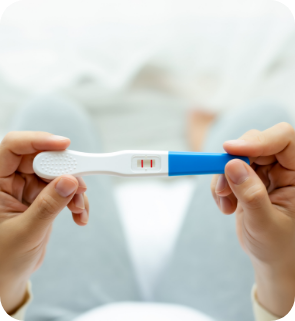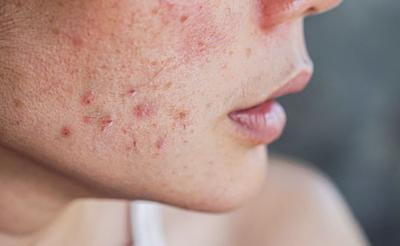
How To Lower Testosterone In PCOS
What's Driving High Testosterone Levels in Women with PCOS?
High testosterone levels are the cause of many unwanted symptoms of PCOS, including; irregular periods, fertility issues, hair growth, hair loss, and acne. There are three main sources of high testosterone in women with PCOS. One, two, or all of these 'triggers' may be affecting you but, as always with PCOS, maybe none of these issues are affecting you due to the individual nature of PCOS. Before we get into the nitty gritty, take a look at the table below which provides a top level overview of what we'll be talking about.
High testosterone levels are the cause of many unwanted symptoms of PCOS, including; irregular periods, fertility issues, hair growth, hair loss, and acne. There are three main sources of high testosterone in women with PCOS.
1️. THE OVARIES
Ovarian testosterone is triggered by excessive or high amounts of insulin in the bloodstream, mainly caused by insulin resistance.
Insulin resistance is when the cells of your body no longer react to insulin as they should. This leads to a build up of insulin within your bloodstream.
It's estimated that between 50% and 70% of all women with PCOS will have a varying degree of insulin resistance.
If insulin resistance is left untreated it can develop into prediabetes, and type II diabetes.
This is why women with PCOS have far higher rates of type II diabetes compared to women without PCOS.
Insulin also lowers sex hormone-binding globulin, a protein in your blood that attaches itself to testosterone to make it inactive. Lowers levels of SHBG, due to high insulin levels leaves androgens free to act on receptors.
Therefore, to lower ovarian testosterone production you must focus on reversing insulin resistance
Here's how:
👉 Follow a low-carb diet (20-30% of overall calories) to reduce the amount of BSL and insulin spikes
👉 Combine regular sessions of resistance, restorative and HIIT workouts to help improve insulin sensitivity.
👉 Get your sleep! Sleep is a master regulator of your entire hormone system. 7 hours at least per night!
👉 Take supplements that will help with insulin sensitivity such as Inositol (3-4g daily), NAC (600mg-1.5g daily), and chromium (20mcg daily).
2️. THE ADRENALS
Adrenal testosterone (DHEA-S) is caused by chronic levels of stress, the adrenals are responsible for the production of your stress hormones. Therefore, to lower adrenal testosterone production you must focus on reducing your physical and emotional stress levels.Although the ovaries are the main source of increased androgens in PCOS, between 20 and 30% of women with PCOS have adrenal androgen excess, detectable primarily by elevated dehydroepiandrosterone sulfate (DHEAS) levels in blood tests performed by your medical expert.
Women with PCOS demonstrate a generalized hypersecretion (overproduction) of adrenocortical products, basally and in response to ACTH stimulation. What the heck does this mean?
Basically, stress releases the stress hormone, cortisol. When your adrenal gland is producing cortisol, it's also producing DHEA-S. Women with PCOS produce more cortisol than women without PCOS.
Tests for Adrenal Androgen Excess
1. 4-point cortisol panel (AM, noon, PM, night)- Saliva
2. Free (unconjugated) cortisol metabolites - Urine
3. DHEA - Serum
4. DHEA-S - Serum
5. Androstenedione (in relation to your age) - Serum
6. Sex hormone-binding globulin (SHBG) - Serum
7. Total testosterone - Serum
8. Bioavailable testosterone - Serum
9. Dihydrotestosterone (DHT) - Serum
Here's how to best lower adrenal androgen production:
👉 Identify, and work to cut out sources of emotional stress in your life.
👉 Once again, get your sleep in as cortisol (stress hormone) is largely dependant on your circadian rhythm.
👉 Make sure you do your restorative exercise sessions such as walking, stretching, yoga etc.
👉 Take supplements that will help with stress levels such as ashwagandha, omega-3 fish oil, and magnesium.
3️. ADIPOSE TISSUE (body fat)
Testosterone is also produced by fat tissue. This means having excess amounts of fat tissue (being overweight) means there is more tissue to produce more testosterone, and estrogen for that fact.Studies have shown that obesity is associated with profound alterations in androgen secretion (production), transport, metabolism, and action.
Interestingly, there's a difference in how this affects men and men. Obese men are shown to have a progressive decrease of testosterone levels with increasing body weight.
Whereas obese women tend to develop a condition of functional hyperandrogenism, excess testosterone production.
Reduced sex hormone–binding globulin synthesis and circulating blood levels represent the sole common mechanism which is responsible in both sexes.
Therefore, to lower adipose testosterone production you must focus on reducing your body fat levels.
Here's how to do that:
👉 Make sure to eat in a very slight calorie deficit. To do this, use a free TDEE calculator online and find your metabolic rate. Eat 100-300 calories under this number.
👉 Regular exercise is so incredibly powerful. Combine the exercise recommendations as before (resistance, restorative and HIIT workouts)
👉 Focus on the 3 S's of PCOS hormonal balance (stress, sleep, supplementation) I made a post about this a week or two back
















